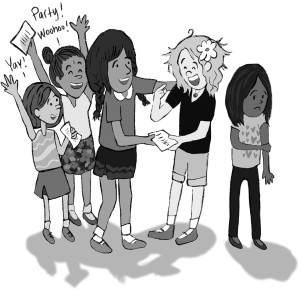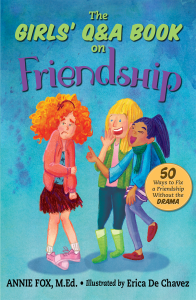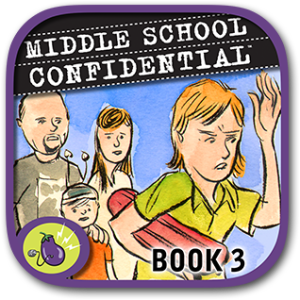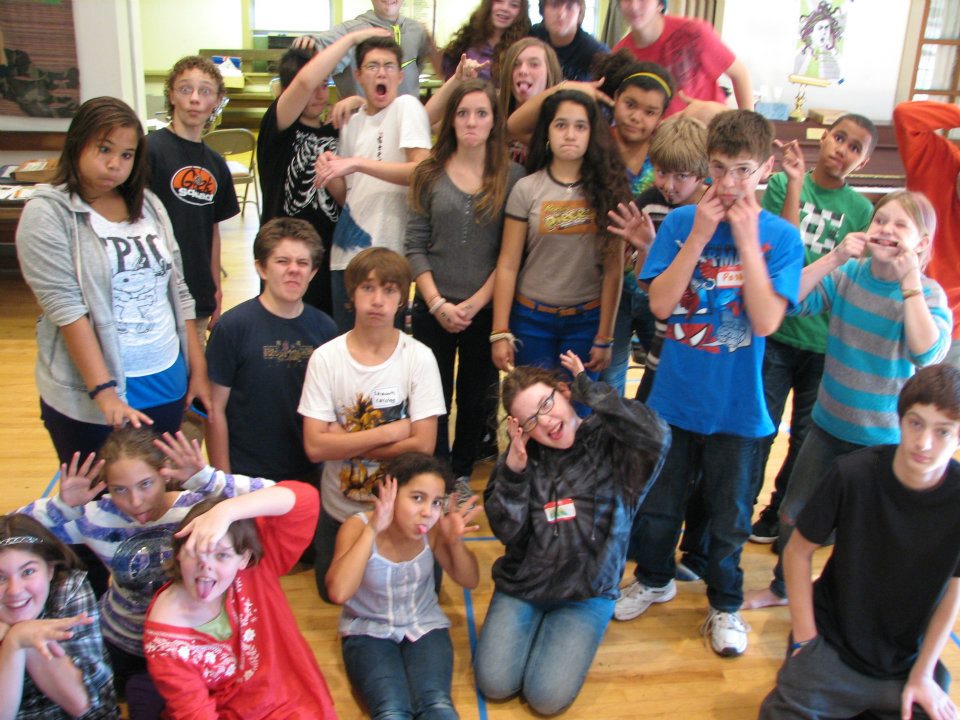|
|
December 20, 2014
T’is the season for parties. When it’s a family affair, all the kids are included. But as you get older, you may want to organize your own get-togethers, and that means only “special friends” get invited. If you’ve been left off a party invitation list you might have felt left-out. But what if you were invited to a party and one of your besties wasn’t? Awkward situation!
This question comes from a girl who found herself in that situation. Her question and my answer are included in my latest book, The Girls’ Q&A Book on Friendship: 50 Ways to Fix a Friendship Without the DRAMA. Read on…
 “I got invited, but my friend didn’t! Awkward!”
Q: “Friend A invited everyone to her party except Friend B. Now Friend B is mad at me for wanting to go. But I need to go so I can be popular. Is it worth it?”
Answer: If understand that you want to go to the party, but if everyone was invited except Friend B, you can understand why she is upset. Maybe you can also understand why she is angry that you want to go without her.
When you say, “I need to go to the party so I can be popular,” I wonder if the Popularity Game means more to you than Friend B. People who ditch friends to be with more “popular” people often find themselves without any real friends.
Should you go to the party? Good question! If you do, then Friend B will probably be unhappy with you. She might get over it, but there is also a chance that your going to the party could really damage the friendship. You are the only one who can decide if it’s “worth the risk. To help you figure it out, think about this: If Friend B go invited and you didn’t, how would you feel about her going with you? If it wouldn’t feel right for her to go, then it’s probably not right for you.
_______
If you’re curious about the 49 other questions and answers in The Girls Q&A Book on Friendship, check out this free excerpt. If you’ve got a friendship challenge you need help with right now, email me or post it to the comments below.
 50 Ways to Fix a Friendship without the DRAMA

December 6, 2014
Still chugging along on The Girls’ Q&A Book on Friendship blog tour. Since early November I’ve stopped at 20 blogs, logged thousands of virtual miles, and answered over 100 friendship-related questions. This question comes from educational psychologist Amy Fortney Parks, founder of TheWiseFamily.com. It’s an important one because when it comes to conflicts between our kids and someone else’s, it can be tricky to know when to step up and when to step back.
How do I talk to my daughter’s friend’s moms about some of the dynamics happening between the girls without being judgmental?
 What did you say about my kid? Annie: Because you don’t want to create more drama than the girls have already dished up on their own, you must communicate to the other mom respectfully, otherwise, you’re going to make things worse. You don’t need me to tell you how parents get instantly and intensely defensive when someone criticizes their children. Hello, Mama Bear! So, think about what you want to say and take at least ten slow deep re-centering breaths before you say it. (Seriously. Breathe.)
Here’s a trick I know about expressing something the other person is unlikely to want to hear: Soften your heart and speak calmly. You might say something like this: “I’ve been noticing some tension between my Gabriella and your Celeste. I’m wondering if you’ve noticed it too?” By starting the discussion this way, you are inviting the other parent in, rather than pushing her away with accusations. You’re asking her to take part in the problem-solving, parent to parent. This is very different from saying something like this: “Celeste has been so mean to Gabriella. My poor daughter cries herself to sleep each night. What kind of girl are you raising?!”
Choices matter when it comes to our words, tone of voice, attitude. This is a lesson we want to teach our daughters so they’ll be more likely to stop, re-center, and think before they act. It helps tremendously when we model it in our own lives too.
Bonus Question for you> How are you teaching your kids to be aware of the way they speak to other people?

August 14, 2014
Your Mom sees one dirty spoon on the sink counter and starts yelling. You politely ask Dad for movie money and he walks past you muttering something about “…growing on trees.” You excitedly tell your daughter, “Keep Saturday open, sweetie, we’re going…” but before you finish, she bursts into tears. Your son is nothing but rude to his little brother and when you try to reason with him he loudly accuses you of not loving him.
 What’s up with my family? There’s an app for that! Later you sit at the dinner table. No one talks or even looks at each other. Yet you’re all connected by a silent question: “What’s up with my family?!”
What’s that you say? Never wondered about that? Bolderdash! For centuries parents and kids have asked themselves “What’s up with my family?” Now, finally, here in the glorious Digital Age, there comes an app with some answers!! I know it’s good, because I wrote it. But don’t just take my word for it, here’s what Carisa Kluver of Digital Storytime has to say:
“Fox covers issues that range from over-protective parents to abandonment and loss deftly in this graphic novel for readers 10 and up. What’s Up with My Family? is a book app with brilliant storytelling, movie-quality sound effects and seamlessly integrated features. Electric Eggplant has set the gold standard for presenting graphic novels in the digital realm. My highest recommendation!”
Bolderdash aside, when it comes right down to it, we love our family. We really do! And sometimes they drive us nuts. Without doubt, we sometimes do our part to drive them nuts too. Even though all families are different, they all have ups and downs.
This is an app for every kid (and parent) who’s ever wondered, “What’s Up With My Family?” It may help you understand the people in your family better. It may also help you use your power to improve things at home. Sometimes you can do that by talking about how you feel. Sometimes, change happens when you shift your attitude and decide to be more cooperative.
Get it now, for your family and you might start talking and laughing at dinner again.
(Press release can be viewed here.)

May 19, 2014
Since September I’ve been doing Skype in the Classroom sessions about Real Friends vs the Other Kind with 3rd-10th graders. (Even did one in Croatia!) Today I beamed into an 8th grade class in Philadelphia. Here are some of those students’ questions along with my answers. I’m sharing them to let you know that you are not alone in dealing with any of this stuff.
Student: What would you do if you had a friend you couldn’t trust but you were trying to give them a chance?
 We’re just a bunch of kids trying to figure out this friendship thing It’s good to give someone a second chance. We all make mistakes, right? Sometimes we’re in a bad mood and we’re rude. Sometimes we’re trying to impress other people and we end up hurting a friend. Before you give someone another chance, though, you have to talk about what happened. You can say, “What you did made me feel like I can’t trust you. I want to give you another chance, but first tell me what the heck was going on when you did that?!” A real friend will stop and think. They’ll say something like this: “I’m really sorry. This is why I did it. I promise I’m not going to do that again.” Then you can say, “Cool” and you move forward in the friendship.
But if your friend says, “I don’t know what you’re talking about!” They’re not taking responsibility for what they did. Even though you may want to trust them again, you haven’t really cleared up the problem. They don’t seem to understand what they did and why it wasn’t OK. Chances are good, they will do it again. If you still want to give them another chance, proceed with caution.
Student: If you’re friends with someone and you know that they’re talking about you, what should you do?
You can’t pretend that you don’t know it, so you have to talk about it. But watch your attitude. If I’m angry and I go my friend and say: “Hey, I heard that you’re talking about me. What’s up with that?!” your friend will feel attacked and will defend him or herself. They may say, “I don’t know what you’re talking about” when they actually know exactly what you’re talking about. Or they may be innocent and ask, “Who told you that?! It’s not true!” Maybe the person who told you was lying because they wanted to mess up your friendship. Bottom line here, if you need to talk to a friend about something important, get the facts first and don’t come out fighting. If you know the truth, calm down and say, “I know you’ve been talking about me and it makes me feel like you’re not a real friend.” Then you close your mouth and you listen to what they have to say. Afterwards, decide what’s right for you to do in this friendship.
Student: Have you ever felt like if you didn’t have a friend you weren’t like… normal?
There were times when I didn’t have a real friend. (That’s the only kind worth having.) It’s OK not to have friends if you know that you are friends with yourself. Being cool with who you are lets you be cool with spending time on your own. That’s way better than hanging out with people you don’t trust or respect. Not having a friend can be lonely and sometimes you might wonder, “What’s wrong with me? How come I don’t have at least one person who I’m really close with?” There’s nothing “wrong” with you. It might just be that the people around you are not a good match for you and for the kind of friend you are looking for. It may be that you’ve got high standards for yourself and for the people you call your friends. That’s a good thing.
If you aren’t finding real friends at school, look outside of school. At an afterschool club. Or a youth group. Or at the park. Just talk to people. I used to go to the library a lot when I was in middle and high school. There were kids there from other schools and I got to be friends with some of them.
If you need new friends or more friends… first you need to know what a real friend is. Make a list of what makes a Real Friend. Use it as your “shopping list.” For example, respect is a really important trait in a friend. You may see someone and say to yourself, “Is this person respectful? I don’t know him or her yet, but do I like what I see in the way this person treats others? Would I want a friend who treats me that way?” Think about what you’re looking for and keep your standards high, for yourself and for other people.
I hope this helps, and tune in next time, for Part 2 of Friendship Issues from the 8th grade. Til then, be a good friend to yourself and others.
 — Older Posts »
| |
















